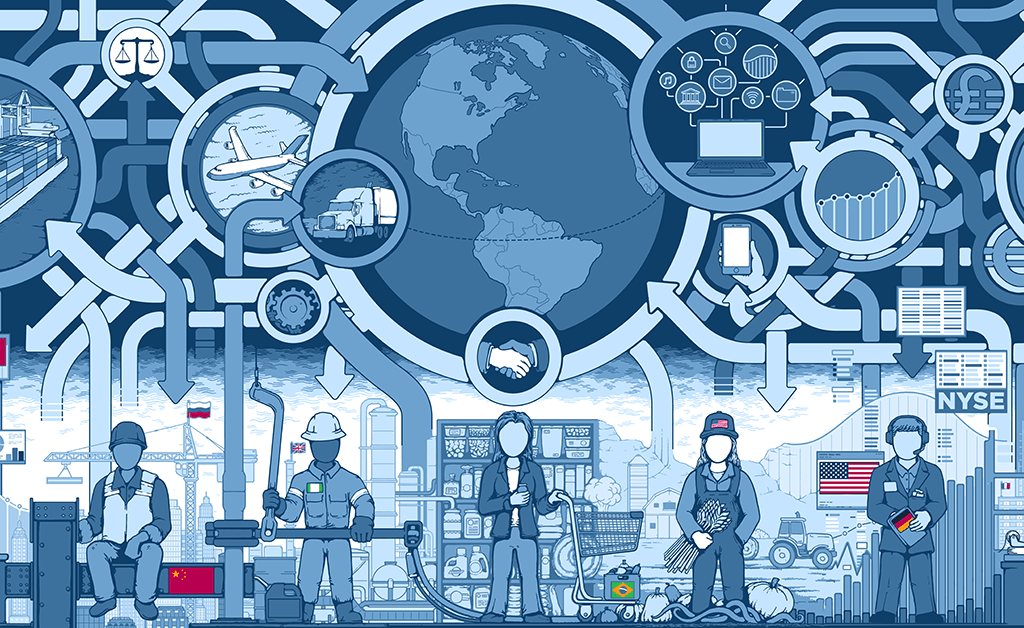Globalization: the increasing interconnectedness of the world through trade, technology, and culture.
Globalization is a phenomenon that has been transforming the world for several decades. It refers to the increasing interconnectedness of the world through trade, technology, and culture.
Facilitated the movement of goods, people, and ideas across borders, creating new opportunities and challenges for individuals, businesses, and governments.

Several factors drive globalization, including advances in technology, the liberalization of trade, and the growth of international finance. Advances in transportation and communication technology have made it easier and cheaper to move goods, people, and ideas across borders.
At the same time, the liberalization of trade has led to the removal of barriers to trade and investment, allowing companies to access new markets and resources around the world.
The growth of international finance has facilitated the movement of capital and investment across borders, enabling businesses and individuals to access financing and investment opportunities from around the world.
The benefits of globalization are numerous. It has led to the creation of new jobs and industries, increased economic growth and prosperity, and the spread of knowledge and ideas.
Globalization has also facilitated the exchange of culture and values, helping to promote cross-cultural understanding and tolerance.
However, globalization has also created challenges and controversies. Critics argue that globalization has led to the exploitation of workers in developing countries. The loss of jobs in developed countries, and the erosion of national sovereignty.
Globalization has also contributed to environmental degradation and the spread of diseases and other global challenges.
The impacts of globalization have been felt differently in different parts of the world. Developed countries have generally benefited from globalization, with their companies gaining access to new markets and resources around the world.
Developing countries, on the other hand, frequently experience exploitation under globalization, with developed countries exploiting their resources and labor.
Globalization has also led to the emergence of new actors and institutions in global governance. International organizations such as the World Trade Organization and the International Monetary Fund have emerged as key players in regulating and facilitating global trade and finance.
Non-governmental organizations and civil society groups have also played a significant role in advocating for the rights of marginalized groups and promoting sustainable development.
Overall, globalization is a complex and multifaceted phenomenon that has both benefits and challenges. It has facilitated the growth of global trade and investment. Promoted cross-cultural understanding, and created new opportunities for individuals and businesses around the world.
However, it has also contributed to inequality, environmental degradation, and the erosion of national sovereignty. As the world becomes increasingly interconnected. Addressing the challenges of globalization and ensuring the fair and sustainable sharing of its benefits is of utmost importance.
Conclusion
Globalization has brought about both opportunities and challenges to the world. It has transformed the way we live, work, and communicate, allowing for greater interconnectedness between countries, economies, and cultures.
The benefits of globalization include increased economic growth, job creation, and the exchange of ideas and values. However, it has also led to the exploitation of workers, environmental degradation, and the erosion of national sovereignty.
Despite the challenges, globalization is a reality of our modern world, and it will continue to shape our lives in the years to come. It is essential to address the negative impacts of globalization and ensure that its benefits are shared equitably.
We must work towards sustainable economic growth and development, promote fair labor practices, and protect the environment. We must also promote cross-cultural understanding and cooperation while respecting the diversity of cultures and values.
Globalization has brought the world closer together and opened up new possibilities for collaboration and innovation.
However, it is essential to navigate the challenges and ensure that the benefits of globalization are shared fairly and sustainably. By working together, we can build a more just, equitable, and prosperous world for all. 카지노사이트

